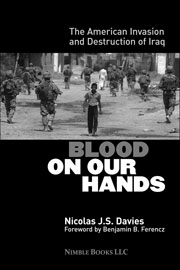No new products whatsoever are coming to the town. We do not have any services at all. I used to work in a company in Tikrit. Until last week I was able to go to my work through Samarra city, but now the army is camping at the edge of Samarra and I can't go any more. The rebels need to defeat all the Shia militias massing up near Duloiaya before they can take the town, otherwise the mortars will keep shelling the city and we won't have peace at all. I'm glad we got rid of the army, which means no more detention, but in the end you need law and order to organise your life.
QASSIM FADHIL, 35
Mosul
People are scared an air strike might be launched by Maliki's forces against Mosul at any moment. Most of the people who have enough money are heading towards Kurdistan. The situation is secure and calm inside Mosul. The rebels – some of them are masked, others are not – are guarding all the official buildings, including hospitals and banks. You can see the flag of the Islamic State in Iraq and the Levant (Isis) flying on most of the buildings in Mosul. There is no Iraqi flag at all.
Ba'athists are in charge now of running the city facilities and official institutions like hospitals, directorates and banks. The new mayor, Hafidh al-Jamas, a former military commander in the time of Saddam Hussein, was installed by the Ba'athists and he is doing his best to make life easy for the people in Mosul by providing fuel, food and by keeping prices low as much as possible. A commander was also installed for Mosul who was a former navy commander in the time of Saddam. His name is Khalid al-Jabin. He was in Syria for many years.
People in the city are circulating rumours that we should be careful of smoking in public, wearing jeans or letting women get out without a veil. But the reality is totally different. You can do and wear whatever you want, the rebels are busy now with their liberation of Iraq, and they do not care what people are doing or wearing.
FARIS SALEEM, 43
Shopkeeper, Tal Afar
I wish the Isis rebels had come to Tal Afar five years ago. They are much better than al-Maliki's sectarian government. These days under Isis we are even safer than in the time of Saddam Hussein. The Isis and tribal rebels are treating the people well and you can be out even at midnight. It is utterly safe and secure. The only problem we have is the drone planes' bombardment of the city from time to time.
Lots of people left the city in fear of more attacks by Maliki's forces and because of lack of power and fuel. We have one hour of power every 10 hours, though the weather is hot. Maliki's government has deprived Tal Afar of fuel – that is why the traffic is almost dead in the city. The rebels are in control of Baiji refinery, but the military forces are gathering inside and the rebels do not want to clash with them and cause a big fire.
I buried my cousin two days ago. He was one of the detainees executed by the military forces in the main prison in the city before they left. He is only 30 years old and was in prison for more than 10 years, accused of terrorism. He got a bullet in his head. The rebels called the families in Tal Afar to come and identify their sons to bury them. The city now is clean of Maliki's brutal forces. The rebels are doing their best to clear the city of them and their militias. We did not have a mayor until now. The rebels are running the city, but they do not interfere with our daily life at all, they help us when we need their help.
SUHAIB SAMI, 33
Government employee, Baiji
There is no clear evidence who is running Baiji, but all the governmental buildings are run by their staff and if they need help the rebels run to help them. The rebels are keeping the town secure and they do not cause harm to any locals. All the shops are open and you can find food.
Our main problem now is lack of fuel. You can hardly see a car running in the town. All the petrol stations are closed and the generators are off. We had only one hour of power yesterday, but today we got two, though the temperature is too high. We were able to sleep for only a few hours. Despite the lack of services, we are happy, as we do no need to worry about being arrested by the sectarian army.



